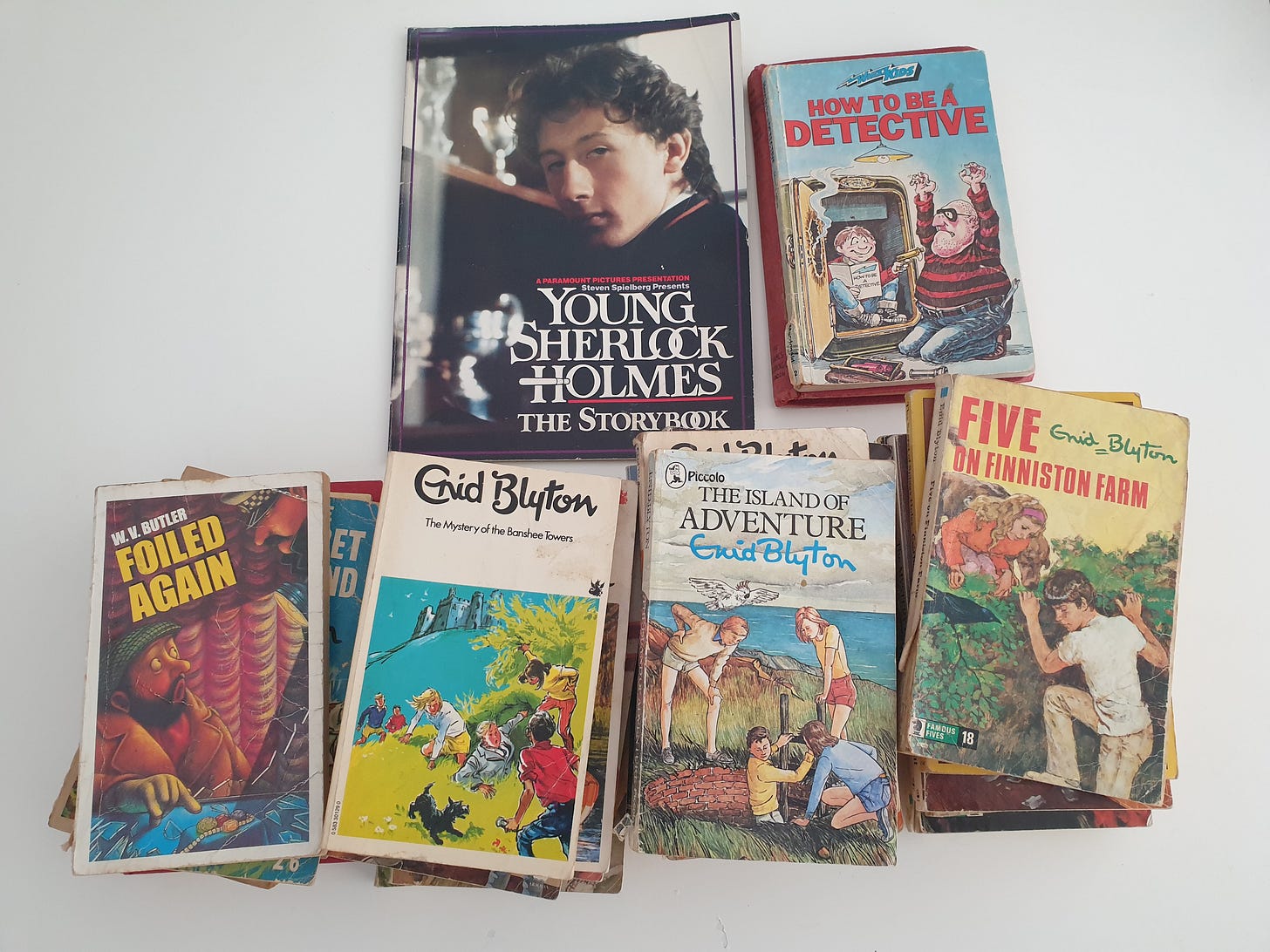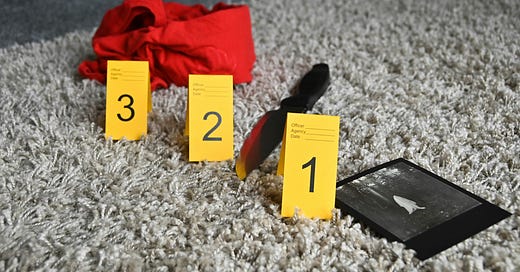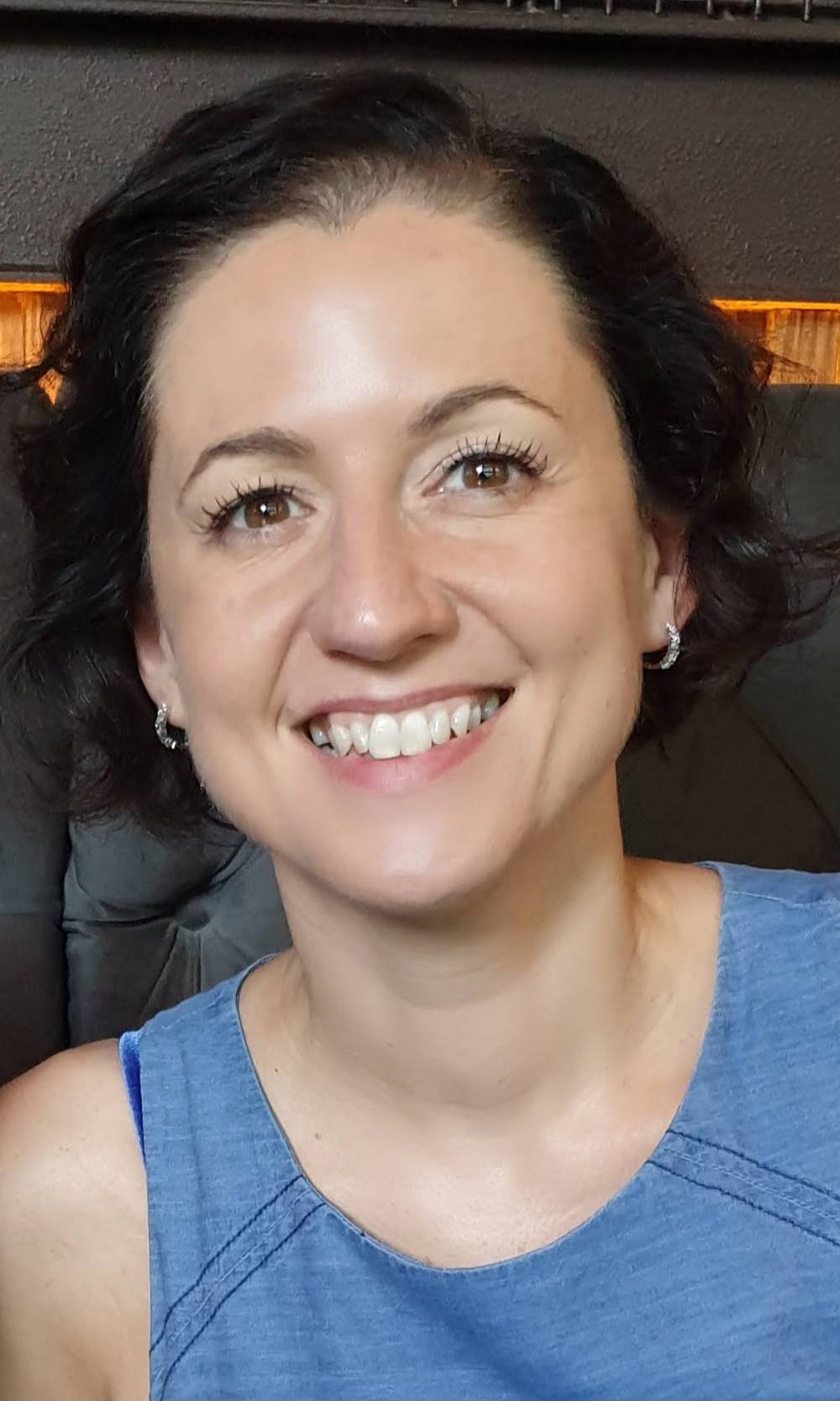How a Childhood Ambition Turned Into a Lifelong Love of Detective Fiction
Guest writer Kate Lillie paints a picture of childhood dreams complete with disguises, beards, and so much more
Hi readers,
Recently, I put out a request for bookish newsletter creators to guest write on SoNovelicious—to take readers on a journey into their reading life. I received several submissions with so many different peeks into how books and reading are important to each of them. Over the next several months, different bookish creators will be featured in SoNovelicious, and they’ll delight you with a peek into their reading life.
Today’s guest writer is Kate Lillie, and she writes the newsletter,
. In each issue of her newsletter, she tells the reader about five books related to a theme, such as laughter, holidays, the classics, and more. What I enjoy about the newsletters is that she tells what each book is about (a blurb-type description), what’s great about it (her reasons for enjoying it), and why the reader might want to try it. This section is beneficial to the reader to determine if it’s a book for them. She offers a paid subscriber option that includes so much more bookish goodness in the form of another book recommendation, a playlist, a poem, and bonus links to other bookish entertainment. Her newsletter is published monthly, and I look forward to reading it every time I see it in my inbox. Welcome to SoNovelicious, Kate!Hi, SoNovelicious readers, and thanks for joining me for a peek into my reading life! I’m Kate, and I write
, where I share five themed book recommendations each month for people who love great stories.What did you want to be when you were little? My brother wanted to be a pilot, and my sister wanted to own a sweet shop or possibly an ice cream truck. I was determined to be a detective. So determined, in fact, that I spent quite a bit of time preparing for my future career. I invested my pocket money in a fingerprinting powder kit and spent hours dusting the surfaces of our house with it before trying to remove the prints with sticky tape (I have no memory of cleaning it up, so I imagine my parents probably had to do that part). I spent many hours tapping the walls of our house and pulling on bits of woodwork, convinced that there was a secret passage hidden somewhere (I was - well, am still - a big fan of Cluedo). I read books about being a detective and pored over my favourite mystery stories for kids, like Enid Blyton's Famous Five series and Nancy Drew. I managed to assemble quite a formidable collection of disguises, which I would use while practicing my observational skills so that when I was a grown-up who needed to stake out real criminals, I'd be a natural.

My favourite disguise comprised a bald cap, a rather bushy false beard in a bright auburn hue, and a vicar's smock with a dog collar. I would carefully apply the bald cap (ignoring the fact that it was adult-sized and therefore inclined to flap a little around the ears), affix the beard carefully to my face, ignoring any tickling sensations, and fasten my fake dog collar and smock with the velcro fasteners behind my neck. Disguise complete, I would carefully cut a pair of eye holes in that day's newspaper and take up my post on the front doorstep, closely observing passersby on my stakeout. I was eight years old. My hero was, of course, Sherlock Holmes, master of disguise and the best detective the world has ever known.
To this day, I don’t know how my parents kept a straight face, but they managed it somehow (at least in front of me), although apparently, they were just holding in their laughter until I left the room. Perhaps the comedy value made up for all the mess of the fingerprinting powder. In the meantime, I was absolutely convinced that anyone looking at me would see a middle-aged male vicar, not a little girl with a long plait hanging out of the back of her bald cap. I suppose that’s a testament to the powers of the childish imagination.
Luckily for the police force (less so for the criminals of the world), while my childhood obsession with detection has never quite gone away, nowadays, I know better than to think I'd make a good detective. That doesn’t mean, however, that I don’t get to solve mysteries anymore. In fact, I get the best of both worlds through my love of detective fiction—no actual real-life crime, but all the joy of solving a mystery from the comfort of my own home.
I think one of the great pleasures of detective stories, whether it's Holmes or any of the many, many detectives who have followed since, is the promise that by the end of the book, the puzzle will be solved. No matter what happens in the book or how bad things get, order will be restored. And, of course, there is the sheer pleasure of guessing—can you work out whodunnit? Even if you guess quite early on, a good mystery still rewards reading; you can enjoy seeing the skill with which a writer can unfurl the story. Can they skillfully plant the clues to guide us along? Can they create characters we really care about? Can they take risks with structure and form and still make it work?
Another great joy of detective fiction is the same as for any genre—being transported to a different place and sometimes a different time. When I want to spend time in Ancient Rome, I turn to Gordianus The Finder, the detective in Steven Saylor’s Roma Sub Rosa series, as he searches Roman society for the clues he needs to solve his most recent case. I also love travelling back to mediaeval England to visit Cadfael, the monk-detective and former Crusader of Shrewsbury Abbey. One choice historical fiction writers have to make is whether to introduce real-life historical figures to the plot. While Saylor makes use of many of the famous Romans we all know of (Caesar/Cicero/Pompey/Crassus/Marc Antony/etc.), author Ellis Peters takes a different approach and concentrates instead on day-to-day mediaeval life (and murder), keeping the historical events of the time largely in the background.
Of course, there can be few people who don’t know of Holmes. He wasn’t the first detective, but he was certainly one of them and is probably the most famous. Interestingly, most of the Holmes stories are short stories, not novels (although there are four of those), and there are fewer murders than you might expect; there are also plenty of thefts and cases of blackmail and fraud. Most modern detective stories tend towards being murder mysteries, sometimes with quite high body counts, so I do admire an author who can pull off the tension and mystery of a good story without needing to use murder to drive the plot forward. Agatha Christie is another author who is adept at this. While there are plenty of murders in her books, there are also various other crimes and, of course, some of the cleverest solutions; not for nothing is the Queen of Crime the best-selling fiction writer of all time.
When I feel like even more Sherlock Holmes and have reread the canonical stories (or relistened to the excellent audiobook version, narrated by Stephen Fry), I turn to Laurie R. King’s astonishingly good Mary Russell mysteries, which begins in the 1920s as a now-retired Holmes takes on a new apprentice, surprised to find himself in the company of an equal at last, and a woman, no less. If I’m looking for a writer who’s as ingenious as Conan Doyle, albeit a lot darker, I turn to Sophie Hannah, whose books are fiendishly clever and often diabolically sinister. I have never read an author who can come up with such outlandish premises for her plots and pull them off every time. Hannah also writes the new, officially authorised Poirot books, which are equally delightful when you feel like some more Agatha Christie.
Sometimes, I travel around the world—Perveen Mistry is the only female lawyer in 1920s Bombay and often finds herself investigating mysteries to help her clients in Sujata Massey’s excellent series. And when I’m hankering after some nature, you can’t beat CJ Box’s Joe Pickett mysteries, where Wyoming game warden Joe finds that his job often involves more than just the day-to-day duties he had expected. Equally, Boris Akunin's or Zoe Ferraris' books are great options for reading about Russia or Saudi Arabia. Alexander McCall Smith’s No. 1 Ladies Detective Agency, set in Botswana, is a masterpiece of both cosy mystery and bringing to life a location many of its readers will never have visited.
One of my favourite aspects of detective fiction is the fact that there are so many series. What a joy to discover a new author you love and find a whole series of books to dive into! Peter Robinson’s Inspector Banks series, set in drizzly Yorkshire, is a perennial favorite. Robinson captures the atmosphere of Yorkshire perfectly—from the scenery through the people to the weather, and his use of music as a reference point throughout the book brings Banks to life. Similarly, Phil Rickman’s Merrily Watkins series has one of the strongest senses of place and some of the most beautiful descriptive writing of any book I’ve read in any genre. Merrily is a vicar and single mum who lives in rural Herefordshire, England, and also happens to be the nominated Deliverance minister for her diocese (that is, the exorcist). Rickman combines brilliant detection with just a hint of the otherworldly or paranormal so that the books stay in mystery territory but leave enough open to interpretation that every story has an extra bit of spine-tingling chill.
Detective fiction can be literature, too. Plenty of literary mysteries exist, like Kate Atkinson’s Jackson Brody series or The Dinosaur Feather by SJ Gazan. The wide variety of different detectives means it’s a genre with something for everyone, whether you love literature, thrills and suspense, or cosy stories with happy endings. As a genre, it just keeps expanding and getting better. We have so many great detectives to choose from. There are cosy detectives (more than ever since the success of Richard Osman’s delightful Thursday Murder Club series), historical detectives, golden age detectives, reluctant detectives, dysfunctional detectives, cerebral detectives, elderly detectives, and everything in between. What’s not to love?
Kate Lillie is a writer and artist who lives in Seville (also known as ‘the unbearably hot bit of Spain’) with her husband, son, dog, and mostly feral cat. She shares a monthly set of themed book recommendations over at
, a newsletter for people who love great stories, and is in the process of trying to get various other art and writing projects off the ground in between looking after a rather rambunctious toddler and disposing of the feral cat's “gifts.”If Kate had a marketing tagline, it would be “Kate Lillie - so many ideas, so little time.” One day, she hopes to have enough hands-free time to get back into textile crafts, but until then, you'll find her working in the margins, often writing on her phone or drawing with one hand while using the other to support the head of the sleeping toddler sprawled across her. It should be noted that the above photo was taken a few years ago when she still remembered what it was like to sleep through the night.
You can find her newsletter at
.I’ve enjoyed getting to know Kate and learning about her childhood dreams of being a detective. As she described her disguises, fingerprinting, and checking for hidden places, I could picture a little girl dressed like a miniature Sherlock Holmes sneaking around corners and trying to stay out of sight. I can picture her parent’s amusement along with Kate’s seriousness, and I can’t help but smile. A child’s imagination is magical.
Readers, head to the comments to share your thoughts; feel free to ask Kate any questions and share with her something about your own reading life so she can get to know you a little better, too.
I hope you’ve enjoyed taking a peek into Kate’s reading life. Her love of detective fiction shows throughout, and she’s provided so many book recommendations to keep your TBR overflowing. I hope you have a wonderful week. Happy reading!









So! Many! Books! This was so great. I’ve been just now discovering my love for a good detective mystery through the Louise Penny series and I can’t wait to check out more from this list!
Could hardly believe it but SoNovelicious's guest writer, Kate Lillie of Five Books For, executed the same sort of detective “disguises” at age eight as did I, as the result of an overactive imagination and blissful days and evenings of reading the Five Find Outers, Famous Five, Magnificent Seven, Sherlock Holmes and more! (By the way, Kate, I don’t know if you ever tried using lemon juice as secret ink. it really does work – the letters show up perfectly when warmed!)